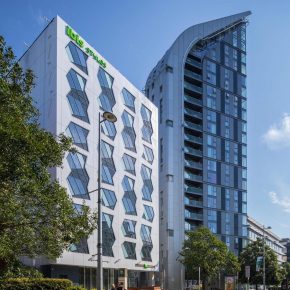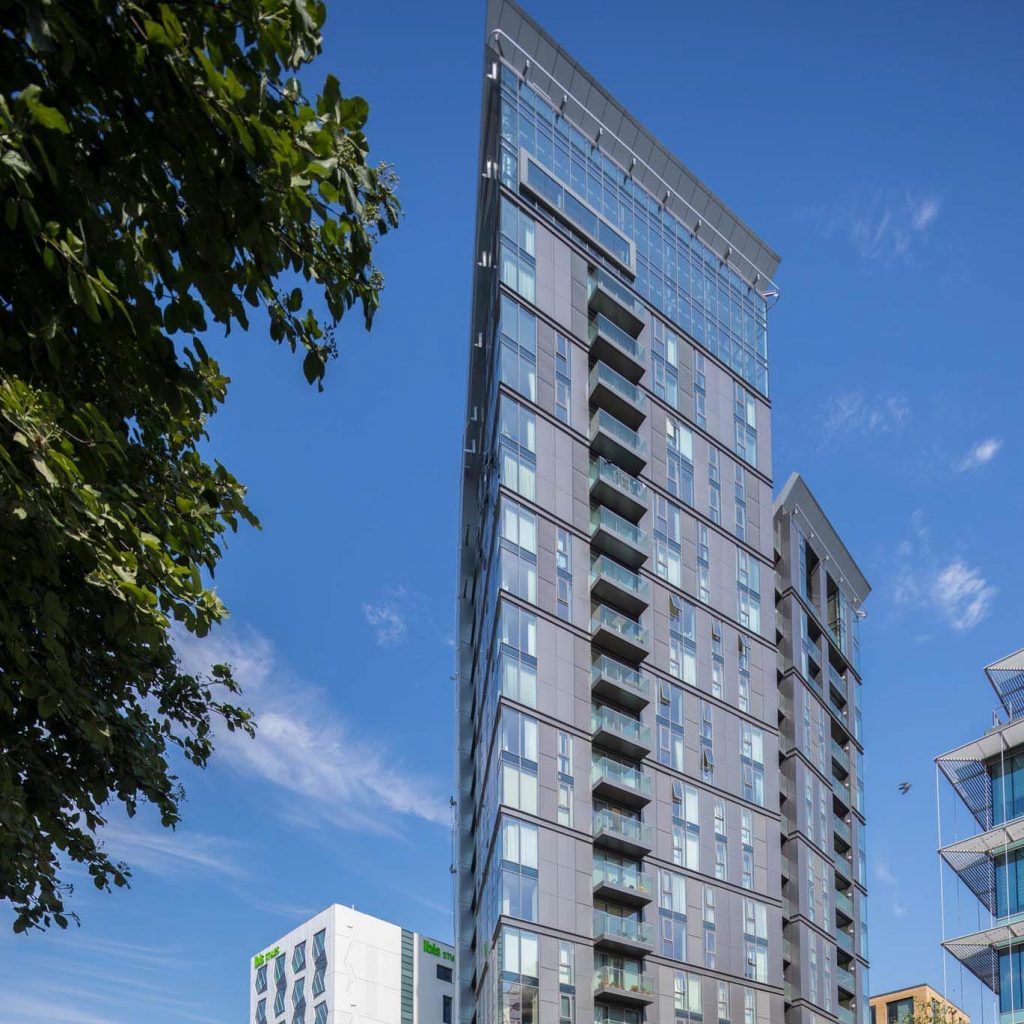
Finishes and Fire Resistance with Aluprof
 The following article sees Wojciech Brozyna, MD of Aluprof UK, talk about finishes, fire resistance and regulations.
The following article sees Wojciech Brozyna, MD of Aluprof UK, talk about finishes, fire resistance and regulations.
“Following Dame Judith Hackitt’s Grenfell Tower report, there has been a great deal of development regarding the specification of finishes and materials for use in dwellings over 18m in height in England.
The recent spate of balcony fires have also questioned the use of combustible materials in these areas. It’s safe to say that the industry is quite confused and in some areas trying to gain clarification of what falls into legislation.
So where do we currently stand and what should we be specifying for windows, doors and curtain walls to be compliant with current legislation?
The government has just released its feedback on its recent consultation ‘Review of the ban on the use of combustible materials in and on the external walls of buildings including attachments’. Whilst not a definitive document, it does demonstrate the way the wider construction industry is moving, it highlights areas where further clarity is required and I would encourage anyone involved in the external envelope to offer feedback on the consultation document which will close on 13 April 2020 at 11:45 pm.

Currently the legislation is only applicable to apartments or dwellings over 18m in height, all other buildings are currently exempt.
Whilst most window materials used at this height are supplied in aluminium, there are quite a number of existing buildings in other materials such as PVC. Although anodised aluminium is completely fire resistant, coatings, such as powder coat can have a ‘limited combustibility’.
In the external envelope we are talking about fire resistance and the possibility of surface spread of flame. This will mean that specified products will need to be non-combustible and gain a Euroclass A1 rating under BS EN 13501-1 or a Euroclass A2-s1,d0 rating of ‘limited combustibility’, but what are these classes and what do they mean?
The BS EN 13501-1 classification comprises three ratings. The first is the main Euroclass rating, will be the reference A1, A2, B, C, D, E or F, with A1 having the highest resistance class, as shown in the simplified tables below.
|
Classification |
Definition |
Description |
|
A1 |
Non-combustible |
No contribution to fire |
|
A2 |
Limited combustibility |
Very limited contribution to fire |
|
B |
Combustible |
Limited contribution to fire |
|
C |
Minor contribution to fire |
|
|
D |
Medium contribution to fire |
|
|
E |
High contribution to fire |
|
|
F |
Easily flammable |
The second classification relates to smoke emission when subject to fire. This is given by a rating of s1, s2 or s3, with smoke emission classifications not being provided for ratings of E to F.
The third classification relates to the level of production of flaming droplets or particles when subject to fire. This is given by a rating of d0, d1 or d2, from highest to lowest performance.
|
Classification |
Level |
Description |
|
Smoke emission |
s1 |
Quantity/speed of emission absent or weak |
|
s2 |
Quantity/speed of emission of average intensity |
|
|
s3 |
Quantity/speed of emission of high intensity |
|
|
Production of flaming |
d0 |
No dripping |
|
d1 |
Low dripping |
|
|
d2 |
High dripping |
Window, door and curtain walls are currently exempt from the ban on combustible materials used above 18m England. This includes the glass and aluminium frames for the glazing.
Together with this, all backing rods, sealants and membranes used in the fixing of these windows and doors are all exempt.
However, and there is always a ‘but’, any opaque spandrel panels used within the glazing are not exempt, as well as other cladding items such as cills and column casings.
Anodised aluminium will carry an A1 rating as it is ‘non-combustible’, powder coated aluminium can carry an A2-s1,d0 as required in the legislation as long as the powders have been fire tested and the thickness of the powder coating controlled.
To further complicate matters, Scotland, Wales and Northern Ireland currently have slightly different recommendations:
– Scotland over 11m: A1 or A2 – latest update 2019
– Wales over 18m: B-s3, d2 – latest update 2016
– Northern Ireland over 18m: B-s3, d2 – latest update 2012
As a specifier independently specifying powder coat, you should ask the powder coater to provide certification that the powder they use is tested for both fire resistance and the maximum thickness that their powder must be applied onto the aluminium to achieve the rating.
“So are all your current specifications for powder coated products that fall within this legislation, used over the maximum height in apartments and dwellings, meeting the minimum standard of a fire rating of A1 or A2-s1,d0?”
As the legislation continues to be in a state of change, if specifying fenestration and cladding products for apartments or dwellings over 18m from GFL, then speak to your aluminium systems company who should offer clear guidance on the subject.
Here at Aluprof we specialise in fire rated screens and facades and are well placed to offer architects and specifiers clear and current advice.
Since setting up the Aluprof Project Office at the Business Design Centre in London the systems company has rapidly grown their specification influence in the UK with their high performance architectural aluminium systems.
Further expansion of the companies headquarters in Altrincham now provides specifiers with meeting facilities and an extensive showroom of commercial systems to view.
With overseas growth across Europe spreading into the Middle East and firm roots already in the East of the USA, the company is becoming a global player in facade supply.”
Aluprof UK
Unit A5
Altrincham Business Park
Stuart Road
Altrincham
Cheshiire
WA14 5GJ
UK
(0044) 161 941 4005
Visit Supplier's page
Latest news

26th March 2025
Encasement Verta column casings - covering up with style
The demands of architects and specifiers seeking to create stylish finishes on a diverse range of building interior and exterior projects are the main drivers behind the versatility and extensive choice available within the Encasement Verta column casing range.
Posted in Articles, Building Industry News, Building Products & Structures, Canopies, Entrances & Column Casings, Case Studies, Interior Design & Construction, Interiors, Restoration & Refurbishment, Retrofit & Renovation, Walls
26th March 2025
Pyroguard launches on-demand CPD webinar
Pyroguard has launched an on-demand version of its RIBA-approved CPD seminar – ‘Fire safety glazing: a system, not a product’ – in a bid to guide the industry regarding the critical role of fire safety glass.
Posted in Articles, Building Industry Events, Building Industry News, Building Products & Structures, Building Services, Continuing Professional Development (CPD's), Glass, Glazing, Health & Safety, Information Technology, Innovations & New Products, Posts, Retrofit & Renovation, Seminars, Training, Windows
25th March 2025
Reduce sound transference with West Fraser CaberAcoustic
CaberAcoustic from West Fraser is a highly versatile, effective and economical sound-reducing flooring solution. Reducing both impact and airborne transmitted sounds, it can be laid over concrete and timber floors in both new and existing buildings.
Posted in Acoustics, Noise & Vibration Control, Articles, Building Industry News, Building Products & Structures, Building Services, Building Systems, Facility Management & Building Services, Floors, Interior Design & Construction, Interiors, Posts, Restoration & Refurbishment, Retrofit & Renovation, Timber Buildings and Timber Products
25th March 2025
Vent-Axia Kicks Off Charity Football Tournament in Support of Cancer Research UK
Ventilation leader Vent-Axia brought together leading building design professionals for an action-packed Charity Powerleague 5-a-side Football Tournament on Thursday 20th March in Shoreditch, London, in aid of Cancer Research UK.
Posted in Air Conditioning, Articles, Building Industry Events, Building Industry News, Building Products & Structures, Building Services, Charity work, Facility Management & Building Services, Heating, Ventilation and Air Conditioning - HVAC
 Sign up:
Sign up: